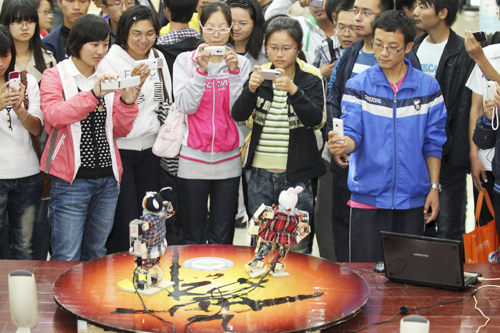|
 |
|
ROBOT SHOW SNAPSHOT: Performances of robots made by students lure visitors taking pictures at the Nantong University in east China's Jiangsu Province on October 13, 2011. Many works of science and technology were displayed at the Seventh College Students' Science Festival of the university, including robots that dance or perform martial arts (XINHUA) |
Young scientists have attracted wild attention in recent years since they may look no different from common people in their daily behavior and manners, except that they often behave contrary to social expectations because of their educational backgrounds. They were in the past considered as science "geeks" with their uncommon behavior, giving an impression that they are only at home in laboratories and speak in indecipherable jargon.
On December 2, Beijing met first snow of this winter. Many either exclaimed their surprise or complained about transportation difficulties. However, a netizen named "Qinghuananbu" (southern Tsinghua) wrote in his microblog: "How can the overnight snowfall in Beijing be called snow flakes? It should be a common chemistry test by the ruler of the heaven who accidentally spilled sodium chloride." One photographer put snowflakes under a microscope on the Internet, with an amusing caption: "The snowflakes are generally shaped like prisms and flower-printed plates, which suggests that the cloud is not thick enough and water vapor is insufficient."
Endeavors to make science popular
The emergence of hip young scientists can be traced back to four years ago, when The Big Bang Theory, a situation comedy about genius scientists in the United States, became popular in China.
The sitcom let many ordinary people understand for the first time that theoretical physicists who have been pondering the origins of the cosmos dream romantically of the girl next door. In the comedy, images of young scientists instantly become interesting when they use a laser to heat instant noodles and liquid nitrogen to flash-freeze bananas. It is because of this sitcom that many young scientists in China shouted that they have met bosom buddies who keenly appreciate their talents. A netizen using the name of the protagonist Sheldon always publishes articles related to popular science on his personal page. He is a doctor of theoretical physicist at Zhejiang University.
Most Chinese students studying in the United States who major in science or engineering are part of a "big bang" with Chinese characteristics. Luo Zhixiang, a doctor of experimental physics at the University of North Carolina, masterfully steams slices of meat with his physical scientist's hands. One of Luo's classmates has made an excellently structured grill with metal processing skills during an internship. In the evening, they will go boating, when students of astrophysics would point to constellations with a laser pen. When hungry, they would use liquid nitrogen to freeze strawberries, making it delicious and crisp outside and tender inside.
Young scientists, unwillingly to be ignored, began to pose in public, as an intellectual youth posted in a microblog: "Preliminary snow has come, will spring be far?"
That young scientists are not understood by ordinary people is largely because they are engaged in research. Ordinary people are not able to enter their realms of work and study. Luo has been annoyed by how he should explain his learning subject. "I said to my grandmother that what I made you can make too, that is, to put together salt, charcoal and water then blend and stir them," he said. "It is hard for me to define what I made, which is an inter-disciplinary study, or using methods of physics to resolve problems of chemistry."
Wu Chaohua, doctor of biomedical engineering at Tsinghua University, felt melancholy when talking about his major. "When some asked, I would answer that I major in biomedical engineering." "Then I'll be asked whether I study biology. I would say I don't understand biology. They then will guess that I am engaged in medicine, but I would tell them I really don't know what medicine should be taken even if I myself catch cold. They then asked what else I am learning, I have to say that I'm studying engineering," Wu said.
What young scientists need to do first is to explain science with a simple and elegant form to ordinary people. "Sheldon" would load on irregular articles of popular science during his spare time. He often uses humor to explain the scientific logic behind various commonly seen phenomena. For instance, he explains some hard understanding nouns of science, such as what are antimatter and neutron rays. He also explains why the moon on the horizon is larger, and how to prevent static electricity in dry winter.
| 